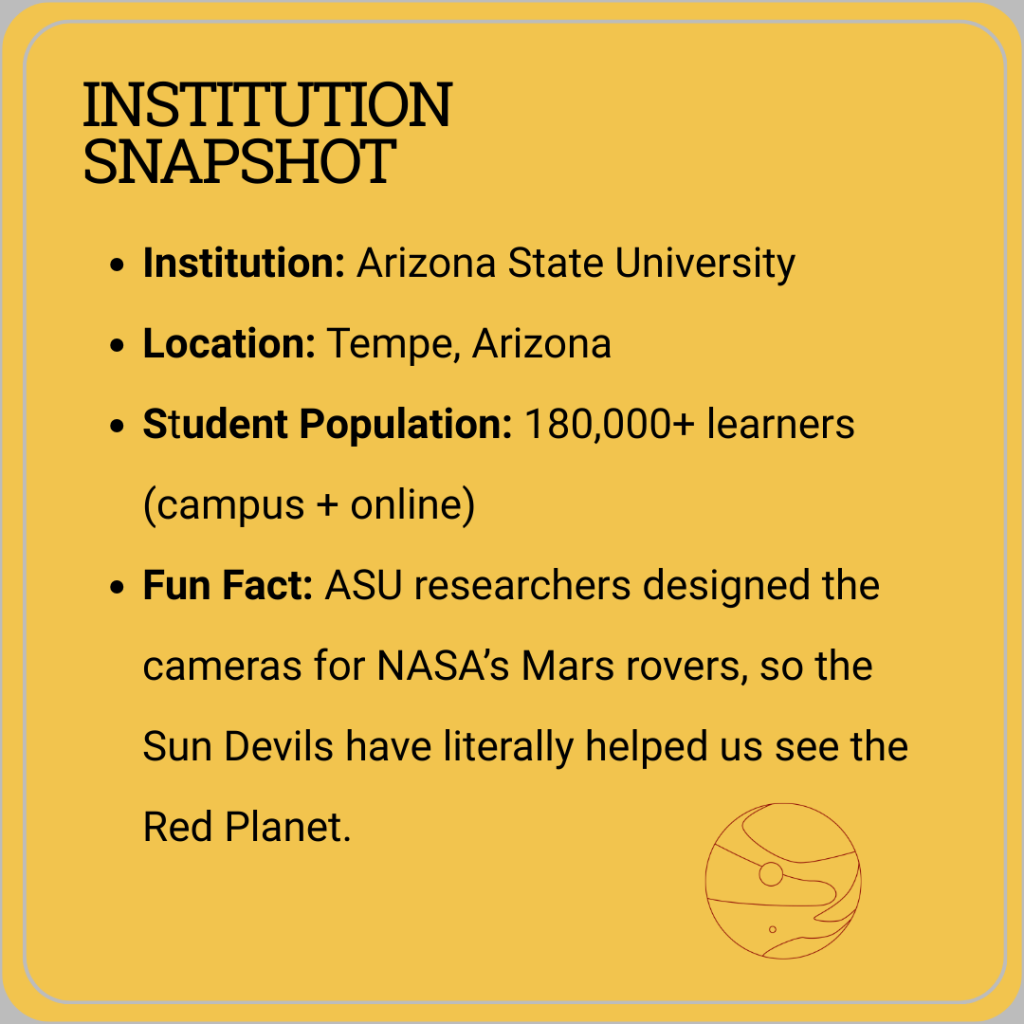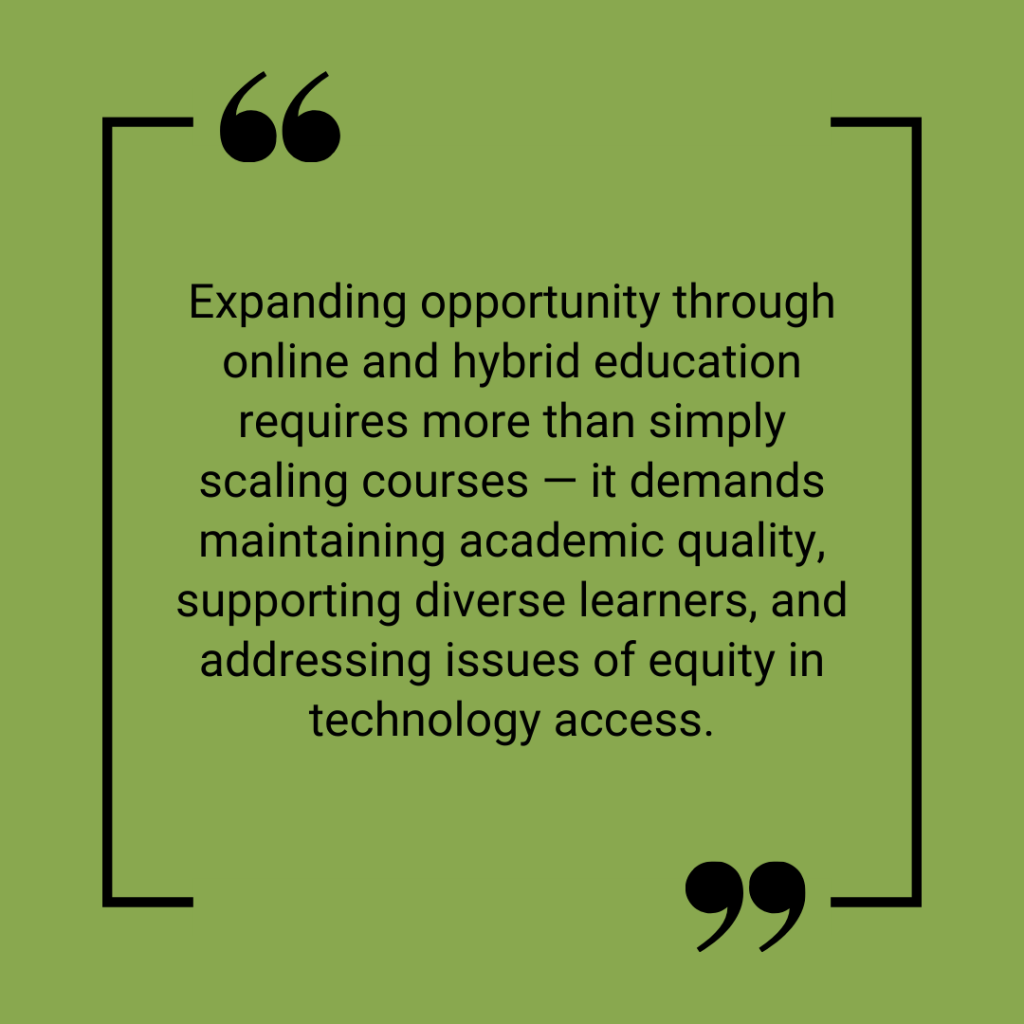WCET Featured Member: Arizona State University
Published by: WCET | 9/9/2025
Tags: WCET, WCET Member Feature
Published by: WCET | 9/9/2025
Tags: WCET, WCET Member Feature
At WCET, our focus is on our community. Every day, our members lead the way in digital learning: innovating, problem-solving, and sharing strategies that shape the future of higher education. To celebrate and spotlight this work, we’re excited to launch a new monthly Featured Member series on WCET Frontiers.
Each month, we’ll highlight one of our member institutions or organizations, giving you a chance to learn more about their mission, current digital learning initiatives, the challenges they’ve faced, and what lies ahead. Each article will include an introduction to the institution or organization and the institution’s responses to a short interview. We hope this series not only shines a light on the incredible work being done out there in the field, but also sparks ideas, connections, and collaborations.
For our first feature, we’re thrilled to spotlight Arizona State University, a long-standing WCET member recognized nationally for its innovation, scale, and impact. We are grateful to ASU for sharing their story with us and kicking off this new series.
Lindsey Downs,
Editor, WCET Frontiers

Arizona State University (ASU) is a leading public research university recognized for its innovation, access, and impact. With more than 180,000 students enrolled across campuses in the Phoenix metropolitan area and through ASU Online, it is one of the largest and most diverse universities in the United States. ASU is known for pioneering new models of teaching, learning, and discovery.
ASU’s Charter is to measure itself not by whom it excludes, but by whom it includes and how they succeed. The university is:
Digital learning is central to Arizona State University’s mission of access, excellence, and innovation. As one of the largest public universities in the nation, ASU is committed to serving learners at every stage of life — from traditional undergraduates to working professionals and lifelong learners. Through digital learning, ASU is able to remove barriers of geography, cost, and time. It enables us to meet learners where they are, offering flexible pathways that align with their personal and professional goals. Digital platforms are also integrating adaptive technologies, data-driven insights, and personalized experiences that enhance student success. By embracing digital learning, ASU not only expands its reach but also fulfills its charter commitment: to serve all learners and to advance the economic, social, cultural, and overall health of the communities it impacts.

One of the key challenges ASU has faced in digital learning is ensuring that access translates into success. Expanding opportunity through online and hybrid education requires more than simply scaling courses — it demands maintaining academic quality, supporting diverse learners, and addressing issues of equity in technology access.
ASU has addressed this by investing in robust student support systems tailored for digital learners, including 24/7 tutoring, success coaches, and accessible course design. We’ve also prioritized inclusive technology practices to make sure all students, regardless of background or circumstance, have the tools they need to succeed.
Another challenge has been preparing faculty to teach effectively in digital environments. To meet this, ASU created professional development programs, collaborative design teams, and faculty innovation centers that provide ongoing training and support for digital pedagogy.
By approaching these challenges with innovation and intentionality, ASU has built a model of digital learning that not only increases access but also fosters meaningful student success outcomes at scale.
At Arizona State University, the future of digital learning is shaped by our commitment to scale, innovation, and student success. We are expanding access to high-quality education globally, using technology to serve learners not just in Arizona, but around the world. Key initiatives include scaling personalized learning through adaptive technologies, integrating generative AI to enhance teaching and support, and expanding stackable, flexible credentials that meet workforce needs. We are also investing in immersive learning environments, such as virtual reality and simulations, to create more engaging and applied learning experiences.
By operating at scale, ASU is not only increasing the number of learners served but also reimagining how digital learning can drive equitable access, career readiness, and lifelong learning pathways on a global level.
Arizona State University is a proud WCET member and values the opportunity to connect with peers across higher education to share strategies, explore innovations, and collectively advance digital learning.
Thank you to Arizona State University for sharing your story with WCET Frontiers! Stay tuned for next month’s Featured Member, and if you’d like your institution to be highlighted, reach out to the WCET team.